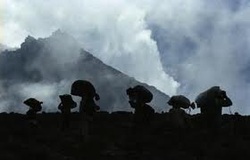
Porters under heavy loads of equipment and food
In my continuing research on Mount Kilimanjaro, I looked into how the National Park (Mount Kilimanjaro National Park, under Tanzania National Parks) makes efforts to meet the varying aspects of fair trade in tourism. Although quite a few of the travel companies and adventure groups I found list several points on their sites about their efforts, after reading Mount Kilimanjaro National Park Regulations, (http://www.tanzaniaparks.com/regulations_and_park_fees.html) and (http://www.tanzaniaparks.com/useful_docs/National_Parks_Mountain_Regulations.pdf) I discovered these features are not unique to the groups, but mandated by the park for the companies’ operation within the park. They include the Five Cornerstones of Fair Trade of Responsible tourism.
1) Fair Working Conditions: All guides porters and cooks are to be proven and documented as healthy, honest and trustworthy and are to be properly outfitted and equipped for their trek. They are to be registered members of a porters association. They are also limited to 18-25kg of weight to be carried.
2) Fair Prices: Fees per day are posted for guides, porters and cooks (all of whom are required per trekking group in the park). $10 (US) per porter per day, $15 per cook and $20 per guide. There are also park fees and fees for each activity in the park.
3) Integration Into the Local Economy and Regional Development: As a National Park, there is no development in the Park but a few private investor funded lodges (some room for leakage), and all employees of the park are locals.
4) Fair Trade Partnerships Between All Actors in Tourism: This area is a little tenuous as all groups must be accompanied by park approved local guides, porters and cooks; travel packages through companies (even though approved by the Parks system) get their cut.
5) Sustainable Resource Use and Environmental Justice: Restrictions in the park are fairly stringent as to number of groups and the number of members per group. All routes and camping/lodging stops are planned and approved as to prevent congestion and concentrated impact. All food containers must be labeled with the travel company’s name (for identification and recognition if left behind) and all trash is packed out. There are designated toilet facilities that must be used or waste carried out. There are no wood fires permitted in the park either.
I was able to find another company called G Adventures that appears to have a very good sustainable touring program as well as Voluntours. Their porter guidelines seemed more developed than the Kilimanjaro requirements, but I could only find their link to their Peruvian guides. I would recommend checking their site out at http://www.gadventures.com /.
1) Fair Working Conditions: All guides porters and cooks are to be proven and documented as healthy, honest and trustworthy and are to be properly outfitted and equipped for their trek. They are to be registered members of a porters association. They are also limited to 18-25kg of weight to be carried.
2) Fair Prices: Fees per day are posted for guides, porters and cooks (all of whom are required per trekking group in the park). $10 (US) per porter per day, $15 per cook and $20 per guide. There are also park fees and fees for each activity in the park.
3) Integration Into the Local Economy and Regional Development: As a National Park, there is no development in the Park but a few private investor funded lodges (some room for leakage), and all employees of the park are locals.
4) Fair Trade Partnerships Between All Actors in Tourism: This area is a little tenuous as all groups must be accompanied by park approved local guides, porters and cooks; travel packages through companies (even though approved by the Parks system) get their cut.
5) Sustainable Resource Use and Environmental Justice: Restrictions in the park are fairly stringent as to number of groups and the number of members per group. All routes and camping/lodging stops are planned and approved as to prevent congestion and concentrated impact. All food containers must be labeled with the travel company’s name (for identification and recognition if left behind) and all trash is packed out. There are designated toilet facilities that must be used or waste carried out. There are no wood fires permitted in the park either.
I was able to find another company called G Adventures that appears to have a very good sustainable touring program as well as Voluntours. Their porter guidelines seemed more developed than the Kilimanjaro requirements, but I could only find their link to their Peruvian guides. I would recommend checking their site out at http://www.gadventures.com /.
 RSS Feed
RSS Feed